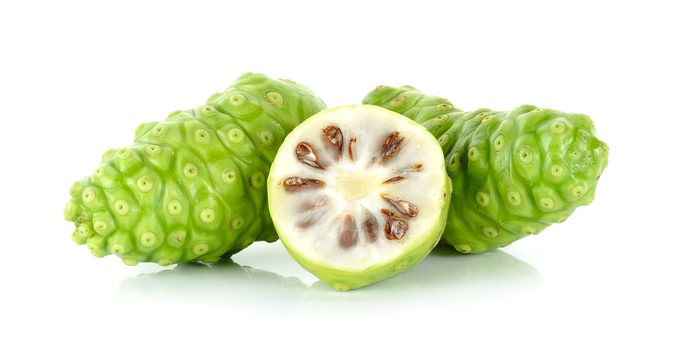Noni

Noni, also known as Morinda Citrifolia, Indian mulberry, nono, nonu, cheese fruit, Ba JiTian.
A small evergreen shrub or tree. The Noni plant has a straight trunk, large elliptical leaves, white tubular flowers, and ovoid yellow fruits. All parts of the Noni plant can be used for nutritional and medicinal health benefits: roots, stems, bark, leaves, flowers, and the fruits. The Polynesians, who imported the fruit from Southeast Asia, discovered the medicinal properties of Noni more than 2,000 years ago.
Today the Noni fruit is eaten in many parts of the world, mainly in the Pacific Islands, Southeast Asia, and Australia. Those who recovered from illness after eating the Noni fruit referred to it as the fruit of God.
In 2003, Noni juice was approved by the European Commission as a novel food and later approved for distribution around the world. The ripe Noni fruit has an unpleasant taste and odor, traditionally made by fermenting the fruit to make a healthy juice. It grows naturally on Pacific islands where it has been used by traditional healers for hundreds of years.
It has recently gained popularity in North America, where it is marketed for the treatment of a variety of ailments. Although Noni juice has been found to be a potent antioxidant, most of its benefits have not yet been substantiated with solid scientific evidence, according to Will McClatchey in an article entitled “From Polynesian Healers to Health Food Stores: Changing Ethnopharmacology of Morinda Citrifolia,” published in the “Journal of Integrative Cancer Therapy.”

Active Ingredients of Noni Juice
The medicinal effects of Noni juice are thought to be a result of the numerous phytochemicals found in the juice. Phytochemicals are substances, derived from plants, which play an important role in overall health but have not yet been established as essential nutrients.
According to a 2011 research article in the journal “Evidence-Based Complementary and Alternative Medicine,” a scientific analysis of Noni juice found it is high in the following phytonutrients: saponins, triterpenes, steroids, flavonoids, and cardiac glycosides.
List of Purported Health Benefits Anecdotal evidence suggests that Noni juice may be helpful for the treatment of arthritis, atherosclerosis, bad breath, bacterial and fungal infections, cancer, depression, detoxification, diabetes, diarrhea, heart trouble, high blood pressure, hypertension, indigestion, inflammation, fever, gastric or oral ulcers, gingivitis, menstrual cramps, nervous system support, pain relief, respiratory disorders, senility, skin infection, sore gums, sore throat, toothache, tuberculosis and weight loss.
McClatchey says that most of these benefits are based on testimonials and only a few are backed up by scientific evidence. The Noni antibacterial compounds within the fruits (acubin, L-asperuloside and alizarin) and roots (anthrauinones) contains scopoleti—inhibits the growth of Escherichia coli—which is responsible for intestinal infections and Heliobacterpyloriulcers—cause of ulcers. Damnacanthal, which is found in the Noni roots, inhibits the tyrosine kinase and gives Noni antitumor activity.
Noni for Diabetes
Preliminary studies have found Noni juice to be an effective supplement for the treatment of diabetes. According to the Evidence-based Complementary and Alternative Medicine study, diabetic animals showed a significant normalization of hyperglycemia—high blood-sugar levels—occurred after 20 days of treatment, which was equivalent to the pharmaceutical diabetic drugs used on the a separate group of animals for comparisons. The animals taking Noni juice also had significantly less liver damage and fatty deposits in their livers than animals in the placebo group. Noni juice’s mechanism of action is not yet known, but it is suspected that Noni either helps to promote insulin secretion or enhance insulin sensitivity in the body.
Noni for Cancer
Noni has become the subject of research as a therapeutic supplement for cancer patients. Studies show that Noni stimulates an immune response, most likely as a result of polysaccharides (antioxidant-rich substances found in Noni juice). One study found that the polysaccharides in Noni juice helped to prevent the proliferation of breast and colon cancer cells. Another substance that was found in Noni, called a glycoside, is said to inhibit cancer cells from attacking and damaging DNA and replicating. This research is still preliminary, but McClatchey says that studies are showing promise for the use of Noni as a therapeutic adjunct for cancer sufferers.
